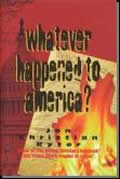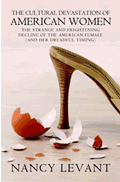PART 3
Erica Carle
November 24, 2009
NewsWithViews.com
Kooky 'Let It All Hang Out' Seminar
FROM: "Truth In Education – October 30, 1975
On October 20 I observed an experimental seminar on drug education at the Kenwood Conference Center of the University of Wisconsin/Milwaukee. Ten teams from area schools had been invited.
Each team consisted of five members. Wauwatosa's team was made up of the principal and two teachers from Whitman Junior High plus two representatives from the Wauwatosa Health Department.
First was a dramatization called SHUT UP, CLASS, which I missed, but was told it had been a very stiff and formal classroom situation with the teacher reading in monotone from a book.
A second dramatization called LET IT ALL HANG OUT was starting just as I arrived. The 'actors' and 'actresses' entered the room laughing, hugging and kissing. As they reached the stage area participants kissed each other with very close body contact. A sturdily built young man sat on one of the chairs and turned his face up to receive a kiss from 'teacher'. Then he let down his suspenders, took off his shirt and stood half facing the audience while a girl rubbed his bare chest with oil. Another young man took one of the girls in his arms and gave her a bent over backward type kiss. A large black girl started jumping and stamping around the stage area waving her arms and shouting, "I'm into myself! I'm into myself!" One of the men picked up one of the other girls and carried her off the stage in his arms. The whole group exited laughing and talking. The black girl was still waving her arms and shouting, "I'm into myself! I'm into myself!"
Next on the program was a young woman named Alice Swanson who was introduced as the Director of STASH, the largest non-profit agency for Drug Education in the state (STASH STANDS FOR student Association For the Study of Hallucinogens, Inc. It was formed in 1967 by a group of students from Beloit College and now has its headquarters at 118 S. Bedford St., Madison, Wis.)
Alice wore jeans, a plaid shirt, and had dark ash blonde hair that reached to her waist. She wore no makeup. She explained that drug programs up to this time had failed. Those of the police and those of the medical professionals had failed because they were not honest. They had misrepresented drug users as the dregs of society. The later programs in the schools had failed because kids did not believe the scare technique and the stories about marijuana causing brain damage, etc. The latest approach is honest communication with the hope that young people will make the right decisions.
All, she said, had really failed because they were attempts to go into the schools with standards and values and try to get the kids to accept them. The instructors always talked about drugs and not the human characteristics involved in drug use.
This brought her to confluent education and why she thought this approach would work. (THE TERM 'confluent education' was coined by George Isaac Brown of ESALEN, the sensitivity training and behavior modification center in California that was funded by the Ford Foundation.} Confluent education, she said is the very simple recognition of fact that learning involves human emotions as well as information. It is introducing techniques into teaching that involve feelings as well as concepts. "I feel I will not use drugs destructively."
Alice stated, "I don't think you are going to stop drug abuse, period! It is part of our culture." She then explained, we can't tell another person what decision to make, but we can help him get in touch with himself, become aware of his emotions and feelings. Attempting to stop drug abuse is an unrealistic goal. Educators should accept the fact that the decision to take drugs is a personal decision based on values and feelings as well as factual information. There is no guarantee that students will make wise decisions, but the decisions they do make will be based on the reality that they perceive. This does not necessarily mean that they will never take drugs; their use of drugs will be experimental or recreational, rather than harmful or destructive.
Alice suggested that teachers make the effort to integrate the techniques of confluent education into all areas of the curriculum whenever possible.
Next on the program was a division of the large group into discussion groups. These smaller groups were formed when each person opened an envelope he had received on arrival. The title of a song to hum was written on the slip inside the envelope. Group members identified each other when they found someone humming the same song they were humming.
As I stood looking at the book table, the "Mary Had A Little Lamb group filed past me; then the "Three Blind Mice"; followed by "Jingle Bells" and "Should Auld Acquaintance Be Forgot." I observed the "Mary Had A Little Lambs in the living room. They sat in a circle and each introduced himself. The discussion leader began by introducing herself and describing her feelings to the others, "I'm a little bit anxious, but happy to know you." Each introduced himself when he felt like talking and told a little bit about his feelings on the seminar and about drugs.
After the introductions were over the leader announced, "I'm feeling calmer than I was at first. I was charged up from the skit." She made the statement, "We are a drug culture."
In discussing drugs the following substances were included: hallucinogens, alcohol, cigarettes, coffee, aspirin – and one girl even added that food was her 'drug' because that's what turned her on.
The discussion then turned to the subject of what people want when they turn to drugs. The following were mentioned:
(1)
Relief from stress
(2) socializing
(3) to feel good.
One of the participants, a longhaired young teacher, admitted he used drugs. He also mentioned he had been to India and studied with Swami Rama at the International Foundation of Yogi Science and Philosophy. A short recess followed the get-acquainted discussions, and then five different classes were offered:
(1)
An Experience of "Futurese"
(2) Drama and Improvisation
(3) American History social studies
(4) High school English -- A poetry Experience
(5) Psychology and the Search For Self.
I attended the session called "An Experience of 'Futurese". It was conducted by Sr. Barbara Kraemer of the School Sisters of St. Francis. The session was very similar to those I had attended at social studies conferences. It consisted of canned questions to get people to think about particular imaginary events at particular dates in the future. The idea is to get people to think about social and moral changes, and also to promote the idea that if 'we' act now 'we' can control our own collective future. We must be prepared for changes in social and moral standards. The personality of the discussion leader is not important because all the questions and responses are programmed.
J. C. Penney Co., for example, puts out a kit for teachers that tells a discussion leader or teacher exactly what to say and do. While I did not attend the afternoon sessions I did pick up materials that described techniques used. We will continue our discussion of this seminar and the materials in future articles.
|
Subscribe to the NewsWithViews Daily News Alerts! |
When you learn even more about what happens in government and community drug programs, I think you will agree that any alderman who would vote for a Community Drug Information Center does not deserve to be in office.
Click here for part -----> 1, 2, 3, 4, 5,
[Read Erica Carle's books: Why Things Are The Way They Are. and "Give Us The Young"]
� 2009 Erica Carle - All Rights Reserved
Sign
Up For Free E-Mail Alerts
E-Mails are used strictly for NWVs alerts, not for
sale
Erica Carle is an independent researcher and writer. She has a B.S. degree from the University of Wisconsin. She has been involved in radio and television writing and production, and has also taught math and composition at the private school her children attended in Brookfield, Wisconsin. For ten years she wrote a weekly column, "Truth In Education" for WISCONSIN REPORT, and served as Education Editor for that publication.
Website: EricaCarle.com
E-mail: hist.detective@yahoo.com
















